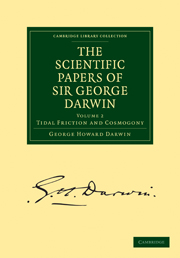Book contents
- Frontmatter
- PREFACE
- Contents
- Chronological List of Papers with References to the Volumes in which they are or probably will be contained
- Erratum in Vol. I
- TIDAL FRICTION AND COSMOGONY
- 1 On the Bodily Tides of Viscous and Semi-elastic Spheroids, and on the Ocean Tides upon a Yielding Nucleus
- 2 Note on Thomson's Theory of the Tides of an Elastic Sphere
- 3 On the Precession of a Viscous Spheroid, and on the Remote History of the Earth
- 4 Problems connected with the Tides of a Viscous Spheroid
- 5 The Determination of the Secular Effects of Tidal Friction by a Graphical Method
- 6 On the Secular Changes in the Elements of the Orbit of a Satellite revolving about a Tidally Distorted Planet
- 7 On the Analytical Expressions which give the History of a Fluid Planet of Small Viscosity, attended by a Single Satellite
- 8 On the Tidal Friction of a Planet attended by Several Satellites, and on the Evolution of the Solar System
- 9 On the Stresses caused in the Interior of the Earth by the Weight of Continents and Mountains
- INDEX
8 - On the Tidal Friction of a Planet attended by Several Satellites, and on the Evolution of the Solar System
Published online by Cambridge University Press: 07 September 2010
- Frontmatter
- PREFACE
- Contents
- Chronological List of Papers with References to the Volumes in which they are or probably will be contained
- Erratum in Vol. I
- TIDAL FRICTION AND COSMOGONY
- 1 On the Bodily Tides of Viscous and Semi-elastic Spheroids, and on the Ocean Tides upon a Yielding Nucleus
- 2 Note on Thomson's Theory of the Tides of an Elastic Sphere
- 3 On the Precession of a Viscous Spheroid, and on the Remote History of the Earth
- 4 Problems connected with the Tides of a Viscous Spheroid
- 5 The Determination of the Secular Effects of Tidal Friction by a Graphical Method
- 6 On the Secular Changes in the Elements of the Orbit of a Satellite revolving about a Tidally Distorted Planet
- 7 On the Analytical Expressions which give the History of a Fluid Planet of Small Viscosity, attended by a Single Satellite
- 8 On the Tidal Friction of a Planet attended by Several Satellites, and on the Evolution of the Solar System
- 9 On the Stresses caused in the Interior of the Earth by the Weight of Continents and Mountains
- INDEX
Summary
Introduction
In previous papers on the subject of tidal friction I have confined my attention principally to the case of a planet attended by a single satellite. But in order to make the investigation applicable to the history of the earth and moon it was necessary to take notice of the perturbation of the sun. In consequence of the largeness of the sun's mass it was not there requisite to make a complete investigation of the theory of a planet attended by a pair of satellites.
In the first part of this paper the theory of the tidal friction of a central body attended by any number of satellites is considered.
In the second part I discuss the degree of importance to be attached to tidal friction as an element in the evolution of the solar system and of the several planetary sub-systems.
The last paragraph contains a discussion of the evidence adduced in this part of the paper, and a short recapitulation of the observed facts in the solar system which bear on the subject. This is probably the only portion which will have any interest for others than mathematicians.
THE THEORY OF THE TIDAL FRICTION OF A PLANET ATTENDED BY ANY NUMBER OF SATELLITES
Statement and limitation of the problem
Suppose there be a planet attended by any number of satellites, all moving in circular orbits, the planes of which coincide with the equator of the planet; and suppose that all the satellites raise tides in the planet.
- Type
- Chapter
- Information
- The Scientific Papers of Sir George DarwinTidal Friction and Cosmogony, pp. 406 - 458Publisher: Cambridge University PressPrint publication year: 2009First published in: 1908
- 1
- Cited by



